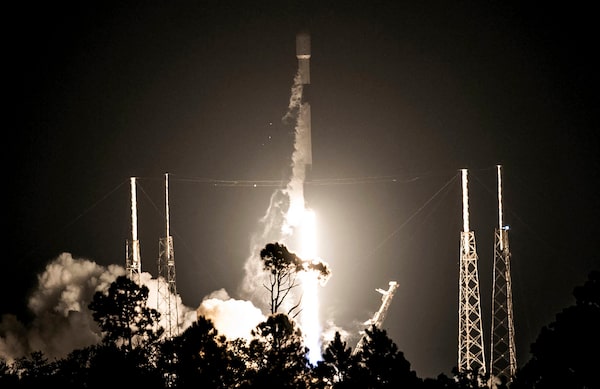
A SpaceX Falcon 9 rocket carrying 55 Starlink satellites lifts off from Cape Canaveral Space Force Station, Fla., on Feb. 12, 2023.Craig Bailey/The Associated Press
Rogers Communications Inc. RCI-B-T expects to achieve its promised $1-billion in cost savings from its takeover of Shaw Communications Inc. SJR-B-T within two years, with $200-million in savings realized by end of 2023 and $600-million by the end of the first quarter of 2024.
The company revealed the amounts and timelines in its first-quarter earnings call Wednesday. Rogers chief executive Tony Staffieri told analysts he had spent the past month in Western Canada meeting with government stakeholders, customers and Rogers staff as part of the process of integrating the two companies.
“Only four weeks in since we closed the transaction, our integration work is well under way,” Mr. Staffieri said, noting that Rogers has already started migrating Shaw’s customers to its systems and merging the smaller company’s day-to-day operations and business development with its own.
During a shareholder meeting later in the day, the company detailed other plans for the year, including a deal with Elon Musk’s SpaceX to bring satellite wireless service to remote areas.
Rogers plans to achieve savings from the Shaw takeover by reducing Shaw’s headcount and eliminating redundancies in media content and vendor costs. The company did not provide specifics about the headcount reduction.
Industry Canada gave final approval to the takeover late last month. As a condition of that approval, Rogers committed to hiring at least 3,000 new employees in Western Canada and maintaining those jobs for 10 years.
In the first quarter of 2023, which ended March 31, Rogers reported a 30-per-cent increase in profits and a 6-per-cent bump in its revenue, compared to the same period last year. The takeover closed in early April, and the associated costs will appear in Rogers’ second-quarter earnings.
The company said these increases were driven by 95,000 new postpaid mobile phone subscriptions in the quarter. That is 44 per cent more than it added in the same period in 2022, despite the first quarter typically being slow for new subscriptions. (Postpaid subscribers are billed at the end of the month for the services they used, unlike prepaid customers, who pay upfront for wireless services.)
Mr. Staffieri attributed the influx of new customers to immigration. He added that the company has not “seen any indication of recessionary pressures.”
Navdeep Bains to join Rogers as company unveils new executive team
In a note to investors, Scotiabank analyst Maher Yaghi wrote that it is likely Rogers has been the most successful of all Canada’s wireless carriers this quarter at adding new subscribers. Telus Corp. and BCE’s Bell Canada will report their first-quarter earnings next week.
Rogers’ capital expenditures were $892-million, up 37 per cent over the same period last year. As part of the Shaw takeover, Rogers committed to spending $5.5-billion on expanding its 5G coverage, and a further $1-billion on expanding its network in rural, remote and Indigenous communities. Those expenses will be reported in future quarters.
The company’s chief financial officer, Glenn Brandt, told analysts Rogers is anticipating between $3.7-billion and $3.9-billion in capital expenditures over 2023.
During the telecom’s annual shareholder meeting, which was also held Wednesday, Rogers chair Edward Rogers announced that his sister, Lisa Rogers, will be appointed to the company’s board, where she will join her three siblings. Lisa is already a member of the advisory committee to the Rogers Control Trust, which controls the telecom through its ownership of 97.5 per cent of the company’s voting class A shares.
Mr. Staffieri said during the shareholder meeting that Rogers will use Starlink satellites, operated by SpaceX, to expand its coverage to remote regions and rural highways not currently served by any terrestrial wireless networks.
The company said texting services would be available in these areas by the second half of 2024, with voice and data services to follow.
The new network will help Rogers customers in remote areas connect to emergency services, according to the company. First responders and carriers are currently updating their networks to provide next-generation features, including texting and images.
Rogers said it would also partner with Lynk Global, a U.S.-based company developing satellite-to-mobile phone systems, to test the new network.
The services will be available to all Rogers customers using 4G and 5G devices, which make up the majority of modern cellphones. Rogers spokesperson Cam Gordon said the company will reveal satellite connection rates for consumers as the services become available.
Michael McNally, a University of Alberta professor who studies rural connectivity, said the announcement is a step toward eliminating mobile dead zones in Canada. But he said the move would be unlikely to present much of a business opportunity for Rogers, considering the sparse populations in the areas it plans to serve with satellites.
SpaceX currently offers direct-to-home internet service through its Starlink satellite constellation for around $140 a month. Because the Rogers services will be for mobile phones, the telecom’s deal will not compete with that service, Mr. McNally said.
Satellite connections are typically used to connect rural and remote communities that cannot easily be served using physical infrastructure on the ground, and where it is not cost-effective for carriers to do so.
While satellite networks have been lauded by some, including the government, as a means of bridging the digital divide, they have historically been slow and sometimes unreliable. Satellites can be influenced by clouds, and even by normal fluctuations of air density.
American carrier T-Mobile made a similar deal with SpaceX in August.